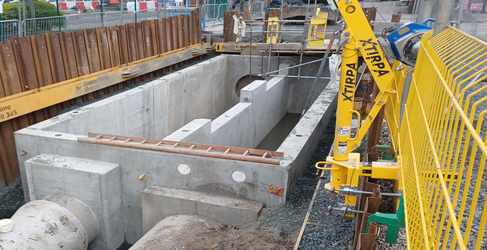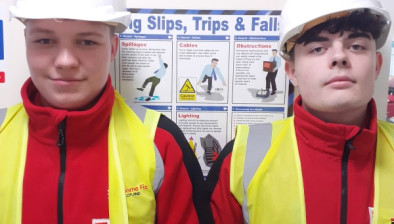Tide turns on Greenock A8 floods

The new screened CSO has been built underneath Inverclyde Council's Pottery Street depot
Scottish Water’s £2.5 million project to tackle frequent flooding on the A8 trunk road through Inverclyde has been completed.
East Hamilton Street in Greenock – which runs parallel to the River Clyde past the James Watt Dock - has been prone to localised floods for many years.
Now, a new screened Combined Sewer Overflow (CSO) will divert excess water through a culvert into the nearby Lady Burn during periods of extreme heavy rain.
Steven Greenhill, Scottish Water’s alliance management team manager said: “This project has been many years in planning and development, and I am delighted to see it completed.
“As well as installing larger pipework under the A8 to connect to the new CSO we have also relined nearly one hundred metres of sewer, effectively installing a new pipe within the old.
“While we cannot say the road will never flood again, it will happen significantly less often and drain significantly faster when it does.”
Work on constructing the new CSO in the grounds of Inverclyde Council’s Pottery Street roads depot began in January 2023.
Six months later, the project moved onto the A8 itself, working in either carriageway and across the central reservation to move other services and install and connect the new upgraded sewer.
The project has been delivered by Scottish Water’s alliance partner Caledonia Water Alliance.
Paul Milligan, CWA’s communication manager said: “The site team has worked extremely hard throughout the winter months to deliver a major sewer infrastructure upgrade to protect this vital road from flooding.
“They have battled the elements – including at least one flash flood –and we are delighted to be able to open the road and get the A8 fully flowing.
“We would like to thank everyone involved in the project and especially the wider Inverclyde community for their patience, understanding and co-operation throughout.”
Tens of thousands of vehicles use the road every day, so a series of contraflows were employed to keep the traffic moving throughout the eight months of carriageway work.
Steven Greenhill added: “We began discussions with the council and other stakeholders at a very early stage to make sure everyone knew what was involved, and to allow their local knowledge and experience to inform our plans.
“There has been a huge amount of co-operation from businesses, agencies, blue-light organisations and the general public to keep the traffic flowing while delivering this much needed project.”
Councillor Michael McCormick, Inverclyde Council’s convener of environment and regeneration, said: “This is a significant moment for the people of Inverclyde and everyone who relies on the A8 day in, day out and we are pleased that Scottish Water have completed this much needed project.
“Road users also deserve a huge amount of credit for their patience and understanding during these works and I am sure they will agree it was some short-term pain to deliver a long-term solution to alleviate flooding on this important link for Inverclyde.”
Stuart McMillan MSP said: “I want to thank Scottish Water for undertaking this work and am delighted this has now been completed.
“Flooding on the A8 has been a problem for decades and with climate change we will have more wet weather to deal with.
“When I started campaigning to get investment along the A8 in 2009, I was determined to see investment. It has been a long journey to get to this point, but I am delighted this has happened. It will make a positive difference and hopefully flooding in this area will be less severe than what we have endured.
“This is a substantial investment and I want to recognise Scottish water for it.”
Ronnie Cowan MP said: “The sort of work required was always going to cause disruption to traffic and the motorists of Inverclyde have been fantastic.
“They have shown great patience and observed the ‘use both lanes’ and ‘merge in turn’ instructions.
“The project has been completed before the expected date and during the works the lane closures were thoughtfully implemented, with road users in mind.
“The outcome should be far fewer road closures, so this should be recognised as a good job well done.”





















